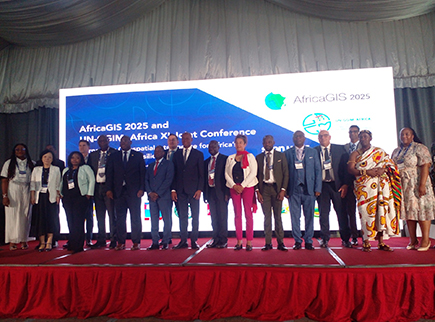Africa, and especially Ghana, have been urged to adopt sustainable financing models through public-private partnerships to leverage geospatial information for sustainable development in pursuit of Africa’s Agenda 2063 and the Sustainable Development Goals (SDGs) by 2030.
Alhaji Yusif Sulemana, Deputy Minister of Lands and Natural Resources, made the call in a keynote address at the official opening of the Africa Geographic Information Systems (AfricaGIS) 2025 Session and the United Nations Global Geospatial Information Management (UN-GGIM) XI Joint Conference in Accra on Tuesday.
Alhaji Sulemana who represented the sector Minister, Mr Emmanuel Armah-Kofi Buah, underscored the importance of capacity building and inclusive human resource development to effectively utilise geospatial data.
He said such efforts would enhance governance, strengthen food security, reduce poverty, and provide sound policy direction.
He announced that government was planning to establish a national geospatial information infrastructure to facilitate the storage and sharing of geospatial data across ministries and agencies.
This, he noted, would improve transparency and efficiency in governance across various sectors of the economy.
Alhaji Sulemana urged stakeholders to take decisive action to close geospatial gaps, stressing that such measures were critical to meeting the needs of ordinary citizens and delivering sustainable development across the continent.
The five-day workshop, on the theme: “Harnessing Geospatial Intelligence for Africa’s Sustainable and Resilient Future” with the sub-theme: “Geospatial Foundation for Africa’s Development, Innovation and Resilience,” has brought together policymakers, government agencies, academia, private sector innovators, and development partners.
Participants were expected to engage in high-level plenary sessions and policy dialogues, UN-IGIF implementation workshops, AfricaGIS technical sessions, exhibitions, and innovation showcases.
Leadership development programmes would also be held, with strong involvement of youth and the private sector.
Organizers of the joint conference described it as a historic opportunity for African nations to strengthen geospatial infrastructure, close data gaps, and address pressing challenges such as climate change, urbanization, food security, disaster response, and digital inclusion.

